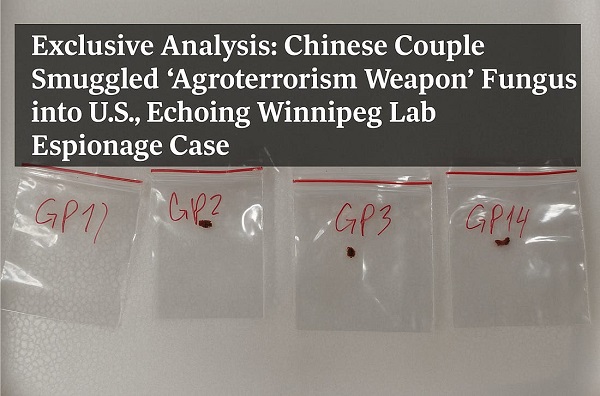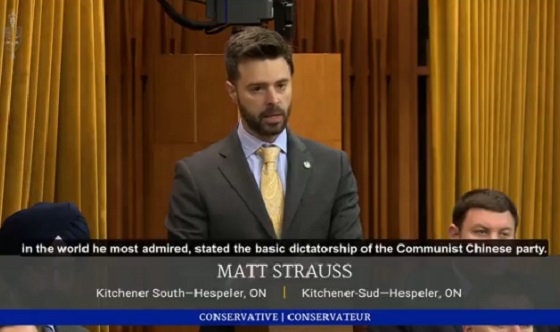Crime
Mexican Cartels Expanding Operations in Canada, Using Indigenous Reserves as Factory Hubs

With Factories on Six Nations Land, Mexican Cartels Are Using Canada to Smuggle Counterfeit Goods Into the U.S. and Mexico
“Project Panda,” a major Ontario gang taskforce takedown in May targeting a counterfeit tobacco factory on the Six Nations Reserve near Hamilton and Buffalo, exposes a long-ignored reality: Mexican cartel networks have deeply embedded themselves in Canadian territory near the U.S. border—and are expanding in tandem with Chinese state-linked crime partners, using Indigenous land for counterfeit production and cross-border smuggling.
This is no longer just a policing matter. It is a national security crisis—one that exploits Indigenous communities, land, and jurisdictional protections that have inadvertently shielded criminal networks now designated as terrorist threats. Worse still, the threat has long been known to Canadian, American, and Mexican authorities. Yet Ottawa has failed to act.
Stunningly, an explosive intelligence report released last year labeled Canada a “safe zone” for Chinese and Mexican cartel networks to traffic weapons, drugs, and counterfeit tobacco through Six Nations land. “Mexican authorities have also stated that Canada is responsible for 12% of all the lost tax revenue for the Mexican Government from illicit cigarettes,” the report says, and alleges that “companies established in Six Nations have introduced up to 500 million cigarettes a year illegally into Mexico.”
That same report says more than 73 illicit factories have operated over the past 20 years, linked to 173 organized crime groups, including Mexican and Chinese networks.
Heavily armed Ontario Provincial Police units, supported by multiple agencies, raided the factory and associated sites on May 1 and 7. The targets spanned Six Nations, Brantford, and Ancaster—territories sitting between Hamilton, Niagara Falls, and Buffalo. What they found was staggering: 1,360 pounds of illegal cannabis, 3.16 kilograms of psilocybin, 15 firearms, and large skids of counterfeit tobacco packaging, valued at over $3 million. The factory is surrounded by barbed fences and trailer trucks. One of the raids intercepted two vehicles leaving the site with 11.1 million contraband cigarettes worth another $2.8 million.
While Project Panda hasn’t, at least yet, addressed fentanyl on Six Nations land, a related investigation—Project Roll the Dice—carried out by Six Nations Police on May 2, 2025, did target fentanyl trafficking. Search warrants were executed at a Mississauga Road residence and vehicle on the Mississaugas of the Credit First Nation. Police seized 58 grams of fentanyl, 17 grams of cocaine, Canadian currency, drug packaging materials, digital scales, and multiple cellphones.
Project Panda drew scant attention from Canadian media, with coverage limited to local outlets. But The Bureau’s document analysis and interviews with law enforcement sources reveal a deeper crisis: Canada’s national security vulnerability runs through southern Ontario and Quebec—stretching from the Six Nations of the Grand River, into Brantford, along the St. Lawrence, and directly to the U.S. border. This corridor has become a protected staging ground for Chinese organized crime, long embedded with the Hells Angels, now operating in concert with Mexican cartels.
Though the factories operate on Indigenous land, Ontario police have made clear they are controlled by non-Indigenous organized crime syndicates.
“This investigation involved a tobacco manufacturing facility operated by members of a non-Indigenous criminal network who do not reside on the territory,” Project Panda investigators stated, adding that tobacco sales directly fund organized crime networks. The profits do not benefit local communities.
Confidential sources told The Bureau that Mexican cartel operatives are behind the factories and reserve-based casinos. Their presence is enabled by jurisdictional grey zones, preferential tobacco tax exemptions, and a persistent political unwillingness in Ottawa to confront the threat.
Behind the Mexican cartels, as in Canada’s fentanyl superlab economy, loom Chinese Triads. Canadian intelligence has long warned of this dual-threat structure. Sources close to Project Panda confirm the violence is intensifying, with shootings and firebombings linked to cartel enforcement groups. Seizure evidence shows high-powered firearms and growing operational sophistication.
This isn’t a new threat. As early as 1997, the suppressed Sidewinder intelligence report—later believed by its authors to have been buried by political actors in Ottawa—warned that Triads linked to the People’s Republic of China were trafficking weapons through reserves such as Six Nations. The report cited connections to Chinese military-run companies and descendants of top Communist Party leaders. “Several large quantities of arms manufactured by Norinco have been confiscated on Indian reserves, especially those of the Mohawks,” it stated.
In 2008, Parliamentary testimony from Imperial Tobacco Canada echoed similar concerns. MPs heard that approximately 150 criminal groups were exploiting Six Nations people and land. At the time, illegal cigarettes made up 22% of Canada’s tobacco market—over 30% in Ontario and Quebec. Of those, 93% were traced to First Nations reserves.
Conservative MP Dave MacKenzie noted: “I do not see the aboriginal community as being the big villains in this whole picture. What we’re hearing now is that they’ve been used by organized crime. The Americans are saying terrorist organizations are using it to fund terrorist activity; I don’t think we have that evidence, but the Americans are saying that.”
A legitimate Six Nations tobacco plant owner—whose Grand River factory is located just hundreds of meters from the cartel-linked plant raided in 2025—described the surrounding area as infiltrated. “If you come to some reserves—for example, Six Nations—it looks like a war zone right now,” the man testified in 2008. “It truly does not look like the Canada that we all want our First Nations kids growing up in.”
“It’s not a normal environment for a young person to grow up in, and if they have to work in a tobacco factory that’s unregulated, how does anybody know whether there are firearms and other things and activities in there? Nobody will be able to answer that.”
These warnings ignored for decades are now being validated by probes like Project Panda and new intelligence. In a recent interview, a senior U.S. government source said concerns over Mexican cartel expansion into Canada intensified after Prime Minister Justin Trudeau lifted visa requirements for Mexican nationals in 2016. The source said U.S. officials repeatedly raised cartel threats in high-level bilateral meetings, but Canadian officials downplayed the risks, frustrating joint law enforcement efforts and compounding intelligence blind spots.
This assessment aligns with a 2023 report from former U.S. State Department official David Luna which described Canada as a “safe zone” for Chinese Triads and Mexican cartels.
According to the Criminal Intelligence Service of Canada, illegal tobacco costs governments over $12 billion in lost revenue. More than 83 contraband brands are distributed worldwide from Canada, with 73 illicit factories documented in the past two decades. Some estimates suggest illicit product accounts for 24% of Canada’s tobacco market. The agency confirms that cartel actors are smuggling drugs and weapons into Canada in exchange for cigarettes.
“Chinese criminals are involved in producing cigarettes on Indigenous reserves, saving money and benefiting from tax exemptions,” Luna’s report states.
Research from the Mackinac Center shows that in New York—a high-tax state—53% of cigarettes are illicit. Many are sourced from Canada. U.S. DEA and ICE officials have traced duty-free cigarette flows to reserves in Ontario and Quebec, through smuggling chains that extend to Panama, Korea, and free trade zones in China.
Chinese Triads are also implicated in counterfeit production, exploiting Section 87 of the Indian Act, which exempts on-reserve goods from taxation. These groups arbitrage that legal gap, distributing low-cost cigarettes across Canada and into foreign markets.
This cross-border trade, concealed behind legal protections and legitimate Indigenous businesses, has become a central artery for cartel financing, narcotics, and arms.
There is no longer any plausible denial: the use of Canadian Indigenous lands by Mexican cartels and Chinese Triads is directly connected to North America’s fentanyl and trafficking crisis. Ottawa’s continued refusal to acknowledge and confront this system is indefensible.
Canada’s security and sovereignty depend on it—now more than ever.
The Bureau is a reader-supported publication.
To receive new posts and support my work, consider becoming a free or paid subscriber.
Invite your friends and earn rewards
Crime
Exclusive Analysis: Chinese Couple Smuggled ‘Agroterrorism Weapon’ Fungus into U.S., Echoing Winnipeg Lab Ebola Espionage Case

 Sam Cooper
Sam Cooper
Potential Bioweapon Smuggling Across Borders: FBI Case Parallels Chinese Military Ties and Bio Espionage at Canada’s Top Lab
In a chilling insider threat case bearing striking similarities to China’s covert use of a married couple to develop an Ebola bioweapon and bat coronavirus research using Canada’s highest-security lab in Winnipeg, a Chinese researcher in Michigan and her boyfriend have been charged with smuggling a biological pathogen described as a potential “agroterrorism weapon” into the United States, according to federal charging documents unsealed Tuesday.
The FBI alleges that Yunqing Jian, a “loyal” Chinese Communist Party member and a 33-year-old postdoctoral researcher at the University of Michigan, and her boyfriend Zunyong Liu, 34, conspired to smuggle dangerous biological material, committed visa fraud, and made false statements to federal agents after U.S. border officials discovered samples of Fusarium graminearum hidden inside Liu’s backpack at Detroit Metropolitan Airport. The reddish plant material—identified as multiple strains of a fungus known to devastate cereal crops—was concealed in four plastic baggies, wrapped in tissues.
It was not the couple’s first illicit border crossing with biological materials. The case underscores a broader pattern: repeated clandestine transfers of biohazards across North American borders; visa fraud by Chinese students accessing elite laboratories; loyalty pledges to the Chinese Communist Party by researchers; and the strategic use of Chinese military-linked research grants—all elements shared with the notorious Winnipeg case.
At Canada’s National Microbiology Laboratory, researchers Dr. Xiangguo Qiu and her husband, Keding Cheng, secretly collaborated for years with China’s top biowarfare institutions—including the Wuhan Institute of Virology and the Academy of Military Medical Sciences. In 2019, Qiu and Cheng coordinated the unauthorized export of live Ebola and Henipah virus samples from Winnipeg to Wuhan. Canadian intelligence documents indicate that Keding Cheng pledged loyalty to the Chinese Communist Party, while Dr. Qiu was recruited as a key collaborator on the Wuhan lab’s bat filovirus project, which multiple Western intelligence agencies now assess resulted in an accidental lab leak that caused the COVID-19 pandemic.
The FBI’s newly unsealed agroterrorism case also details coordinated lab penetration involving facilities in Texas, Michigan, and Zhejiang University in China, dating back to at least 2022. In July 2024, Liu arrived in Detroit on a tourist visa while carrying several undeclared samples of the fungus, in violation of U.S. import restrictions, according to a sworn affidavit.
Since August 2022, Jian—evidently operating under Chinese Communist Party direction—had also worked at a university in Texas, where her research focused specifically on Fusarium graminearum. According to the FBI affidavit, her work at both the Texas institution and the University of Michigan was funded by the Chinese government. Files recovered from Jian’s phone included a signed “annual self-assessment form” dated January 2024 from Zhejiang University, in which she outlined her research accomplishments and affirmed her loyalty to the principles of the Chinese Communist Party.
“Electronic evidence also shows that Jian has been involved in smuggling packages of biological material into the United States on prior occasions,” the indictment alleges.
The allegation of Chinese funding and bonds of loyalty are critical to the case. Radio Free Asia has previously reported that many thousands of Chinese students studying abroad on government-backed scholarships are required to sign such forms as part of their continued funding.
The new U.S. indictment suggests a growing pattern of covert Chinese state-directed espionage activity targeting elite research facilities in North America, with espionage agents working under cover of academics and science—specifically involving romantic pairs who exploit Western institutions and scientific openness to traffic pathogens with dual-use potential.
U.S. Attorney Jerome Gorgan said in a statement: “The alleged actions of these Chinese nationals—including a loyal member of the Chinese Communist Party—are of the gravest national security concerns.”
“These two aliens have been charged with smuggling a fungus that has been described as a ‘potential agroterrorism weapon’ into the heartland of America, where they apparently intended to use a University of Michigan laboratory to further their scheme,” Gorgan added.
According to case filings, “Fusarium graminearum is responsible for billions of dollars in economic losses worldwide each year,” and “toxins produced by Fusarium graminearum cause vomiting, liver damage, and reproductive defects in livestock and humans.”
Agroterrorism is a form of hybrid warfare targeting a population’s food supply and economy. It involves the malicious use of plant or animal pathogens to cause devastating diseases and is closely related to biological and chemical warfare.
Liu and Jian had previously studied the pathogen as university students in China, according to the FBI. Since 2023, Jian had been working at the University of Michigan’s Molecular Plant-Microbe Interaction Laboratory, a facility focused on understanding the molecular biology of crop disease and plant immune responses.
Liu initially told U.S. Customs and Border Protection officers that he didn’t know what the materials were and suggested someone else must have planted them in his bag. But he quickly changed his story under FBI questioning.
“Liu stated that he intentionally hid the samples in his backpack because he knew there were restrictions on the importation of the materials,” the complaint says. “Liu confirmed that he had intentionally put the samples in a wad of tissues so CBP Officers would be less likely to find and confiscate them, and he could continue his research in the United States.”
Court filings show that Liu intended to deliver the samples to Jian’s lab and assist in cloning and culturing the fungus, should earlier experiments fail. Investigators say the couple coordinated in advance and had previously communicated about biological sample transfers.
When investigators spoke to Jian, she denied knowing anything about Liu’s smuggling or plans to research the pathogen.
But an examination of Liu’s and Jian’s electronic devices uncovered WeChat messages from 2022 in which they discussed smuggling seeds into the United States.
“I put them in my Martin boots,” Liu wrote, according to the complaint. “In a small bag. The ziplock bag. Very small.”
“That’s good,” Jian replied, the complaint says. “Just put it in your shoes.”
Liu’s attempt to bring fungal samples into the United States on a tourist visa, without the necessary permits, mirrors the unauthorized transfer of sensitive materials by Dr. Xiangguo Qiu and her husband Keding Cheng, who orchestrated the shipment of live Ebola and Henipah virus samples from Canada’s high-security lab to the Wuhan Institute of Virology in 2019. Documents from Canadian investigations indicated the couple and their students also smuggled biological materials from China into Canada for use in the Winnipeg lab.
Both incidents highlight a reckless disregard for biosecurity protocols and the coordinated use of Chinese students to infiltrate North American labs through visa fraud—bringing materials from China into research institutions and illegally conducting work on the samples using taxpayer-funded facilities to advance China’s scientific and strategic interests. As a Cold War-style scenario between Washington and Beijing heats up, and American military officials warn of China’s “imminent” threat to invade U.S. ally Taiwan, these actions also raise chilling questions about Beijing’s military-aligned objectives for this research.
In the case of the PLA penetration of Canada’s National Microbiology Laboratory in Winnipeg, investigations showed that in 2019, Qiu and Cheng coordinated the unauthorized shipment of live Ebola and Henipah virus samples from the Winnipeg lab to Wuhan, while conducting joint studies with an elite network of bioweapon researchers directly tied to PLA Major-General Chen Wei. CSIS investigations later confirmed Qiu was recruited into the Thousand Talents Plan.
As The Bureau has reported, in August 2018, CSIS warned senior federal health officials of insider threat risks related to Qiu and Cheng. Despite the warning, the couple maintained access to Canada’s most sensitive virology materials for months. Qiu’s collaboration with PLA military scientists on Ebola engineering and bat coronavirus projects was documented in co-authored papers and grant applications and award nominations.
As early as 2013, Keding Cheng filled out an application for the PRC’s “Science and Technology Innovation Talent Program,” requiring applicants to “passionately love the socialist motherland” and maintain Chinese citizenship.
By 2016, Dr. Qiu was nominated for an award by a senior military official from the Chinese Academy of Military Medical Sciences, recognizing her collaborations with Major-General Chen Wei, a leading figure in China’s biological weapons research. CSIS investigations revealed that Dr. Qiu and Major-General Chen collaborated on multiple research projects dating back to 2012.
Dr. Qiu’s use of Canada’s facilities to benefit China was well recognized in Beijing. An award nomination for Dr. Qiu noted that she “used Canada’s Level 4 Biosecurity Laboratory as a base to assist China to improve its capability to fight highly pathogenic pathogens … and achieved brilliant results.”
But in the Canadian case, for unknown reasons, the Chinese couple was allowed to return to China while under RCMP national security investigation.
The Michigan case charges come as the Trump administration is moving to tighten restrictions on Chinese access to U.S. research institutions. “We are looking to revoke visas for Chinese students, especially those with connections to the Chinese Communist Party or studying in critical fields,” Secretary of State Marco Rubio said last week. The Biden-era pause on such restrictions was formally reversed under President Trump’s new executive order in May.
The Bureau is a reader-supported publication.
To receive new posts and support my work, consider becoming a free or paid subscriber.
Invite your friends and earn rewards
Alberta
Pro-life activist describes how child traffickers take advantage of Alberta’s abortion lax laws

From LifeSiteNews
A recent article recounted how a 13-year-old girl was ‘sold’ to sex traffickers, found to be pregnant by her captors, and forced to take chemical abortion pills.
Richard Dur, a political consultant who serves as the executive director of Prolife Alberta, shared grisly details of how human traffickers are taking advantage of the province’s lax abortion laws to get away with essentially whatever they want when it comes to innocent life.
In a recent opinion piece for Juno News, Dur wrote about the shocking tale of a 13-year-old girl who was “sold” to sex traffickers. She was forced to come to western Canada from the Montreal area, found to be pregnant by her captors, and was then forced to take chemical abortion pills.
Dur noted that the girl’s traffickers knew that Alberta, notably the Red Deer area, was “good business,” as the “profits were higher.”
After the girl missed her period, the trafficker’s minder found out, as his job was to “watch the girls, track the bleeding, report anything that might interrupt business.”
The men had in place a “quiet solution” for such situations, that being abortion pills, which are widely available in Alberta without a prescription or doctor visits.
“No doctor’s visit. No age check — not that it would have mattered. Just two pills, mailed discreetly to the door of a short-term rental in southeast Calgary. One to stop the pregnancy. One to flush it out. Reproductive freedom — streamlined for traffickers,” Dur wrote.
After the girl was forced to take the pills, she bled all night by herself. She was forced back to “work” the next day.
Dur noted that this girl’s story is not “fiction” or “hypothetical” but is the “hidden reality behind Project Endgame — Alberta’s largest human trafficking bust.”
Police in the province have noted that traffickers have operated this way for over a decade, with victims being “coerced, transported, and exploited.”
However, what is left out of the picture by officials is that the reason the traffickers can get away with what they do is because of the province’s “permissive, on-demand abortion regime.”
In Alberta, Mifegymiso, which became available to Canadians in 2017, is now legal and free, allowing many women to kill their unborn babies at home without any medical supervision, often resulting in severe injuries to the mother in addition to the trauma of seeing their murdered baby. No ID, pregnancy test or medical exam is required.
Dur noted that another woman, “an older girl, or the trafficker’s assistant,” can obtain the drugs easily for anyone.
“No proof of pregnancy required. All it takes is a phone call and a mailing address. Or the trafficker standing over her, watching, listening. He never needs to leave the room. He never needs to lose control,” he wrote.
Canada’s “free” contraceptive law was passed last year and came about as a result of Bill C-64. The law was introduced by the former government of Justin Trudeau.
Drugs for at-home chemical abortions are typically done in the form of drugs like Mifegymiso. In January, Campaign Life Coalition reported that a 19-year-old Canadian girl died after taking Mifegymiso.
Free contraception is not ‘liberation’ but allows for ‘a license for exploitation,’ says Dur
Dur recounted that the story of the young women forced into the underground sex trade shows how the current system in Alberta and Canada has resulted in girls being enslaved at shocking rates.
“When a 13-year-old girl can be trafficked, abused, and silenced with a phone call and two pills, we must ask: who, exactly, is this system protecting? But she is not the exception,” he wrote.
“She is the victim of a system functioning exactly as it’s been designed to — with no guardrails. That’s not liberation. That’s a license for exploitation.”
Dur observed that for all the Alberta government says it does to combat trafficking, “there’s a glaring loophole in its strategy — one traffickers depend on.”
“Its name? On-demand abortion access,” he noted.
While the United Conservative Government (UCP) has promised to do more to combat traffickers, with Public Safety Minister Mike Ellis saying “Human trafficking is a serious and often hidden crime that devastates lives and communities,” the reality is that it is hidden due in part to abortion pills.
“A trafficker can control a young girl’s body, her movements, and even the consequences of his crimes — because Alberta allows it. If we are serious about protecting the exploited, we must be serious about what’s enabling their continued exploitation,” Dur wrote.
Dur noted that if traffickers can cross borders “without inspection, why wouldn’t they exploit abortion access that’s just as unguarded?”
According to Ellis “We’re not just trying to make headlines — we’re trying to change lives.”
Dur said that the “change” should start today with changing the policy regarding abortion pills taken at home.
“Change the policy that lets predators cover their crimes with a phone call and a mailing address. Close the loophole that puts abortion — chemical or surgical — in the hands of men exploiting vulnerable girls, with no age restriction, no parental notification, no questions, and no oversight,” he noted.
“Because right now, Alberta rescues victims with one hand — and hands them back to their abusers with the other.”
-

 Business2 days ago
Business2 days agoCarney’s Energy Mirage: Why the Prospects of Economic Recovery Remain Bleak
-

 Alberta2 days ago
Alberta2 days agoAlberta Sports Hall of Fame to Induct Class of 2025
-

 National2 days ago
National2 days agoCensured doctor who’s now a Conservative MP calls COVID mandates ‘full Communism’
-

 Censorship Industrial Complex1 day ago
Censorship Industrial Complex1 day agoBC nurse faces $163k legal bill for co-sponsored a billboard reading, “I [heart] JK Rowling.”
-

 Censorship Industrial Complex24 hours ago
Censorship Industrial Complex24 hours agoLegal warning sent to Ontario school board for suspending elected school council member
-

 Daily Caller1 day ago
Daily Caller1 day agoLiberals Embrace Islamic Extremism In Canada
-

 Business1 day ago
Business1 day agoThis Sunday, June 8, is Tax Freedom Day, when Canadians finally start working for themselves
-

 Fraser Institute1 day ago
Fraser Institute1 day agoHealth-care lessons from Switzerland for a Canada ready for reform







